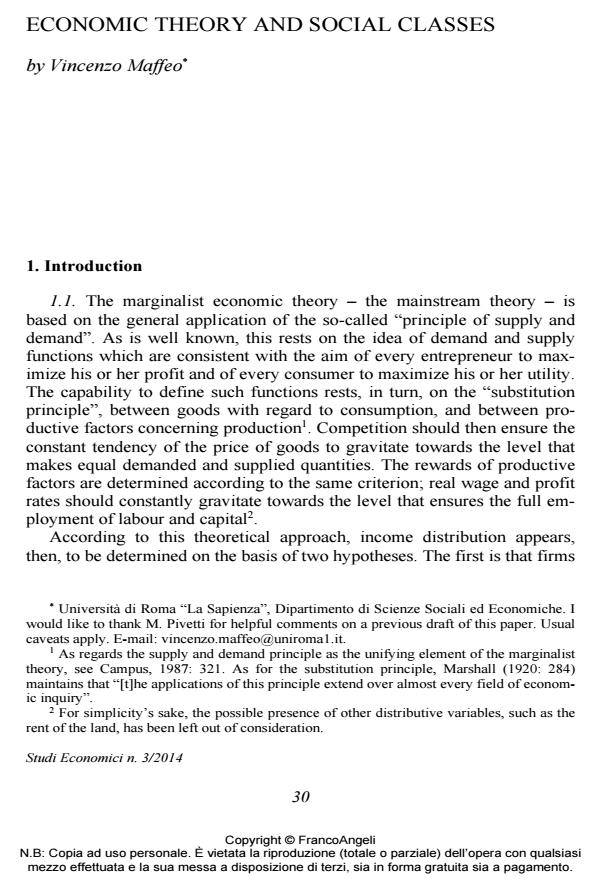Economic theory and social classes
Journal title STUDI ECONOMICI
Author/s Vincenzo Maffeo
Publishing Year 2015 Issue 2014/114
Language English Pages 21 P. 30-50 File size 92 KB
DOI 10.3280/STE2014-114002
DOI is like a bar code for intellectual property: to have more infomation
click here
Below, you can see the article first page
If you want to buy this article in PDF format, you can do it, following the instructions to buy download credits

FrancoAngeli is member of Publishers International Linking Association, Inc (PILA), a not-for-profit association which run the CrossRef service enabling links to and from online scholarly content.
The marginalist economic theory believes that the effectiveness of the collective action exerted by a social class as a whole conflicts with the hypothesis of competition (perfect competition). A question of method is at the root of this view: the marginalist theory only takes into consideration the individual maximizing behaviour of workers, capitalists and entrepreneurs. In this way it excludes from the analysis the study of social links, which, as a matter of fact, are the conditions for collective action. In the classical approach, economic relations are instead affected by the institutions and social conventions that characterize each particular historical moment. As a consequence, the classical notion of competition (free competition) does not exclude a role for the social links that can justify collective action and, at the same time, make it effective. This characteristic of the classical approach is particularly considerable as concerns the theory of income distribution. A re-proposal of the classical theory of wages which takes into consideration the development and complexity of the institutions that, these days, condition the conflict for the distribution of income, cannot actually disregard the role of collective action.
Keywords: Collective action, Competition, Classical theory, Marginalist theory, Income distribution, Social classes
Jel codes: A10, B12, B13, B40, D33, D41, E02, E24, E25
- Campus A. (1987), Marginal economics, in Eatwell J., Milgate M., Newman P. (eds.), The New Palgrave. A Dictionary of Economics, Macmillan, London and Basingstoke, vol. III, pp. 320-2.
- Eatwell J. (1982), Competition, in Bradley I., Howard M. (eds.), Classical and Marxian Political Economy, Macmillan, London and Basingstoke, pp. 203-28.
- Fusfeld D. (1966), The Age of the Economist, Scott, Foresman & Co., Glenview (Ill.).
- Garegnani P. (1983), Notes on consumption, investment and effective demand, in Eatwell J., Milgate M. (eds.), Keynes’s Economics and the Theory of Value and Distribution, Duckworth, London. Garegnani P. (1990a), Quantity of capital, in Eatwell J., Milgate M., Newman P. (eds.), The New Palgrave: capital theory, Macmillan, London and Basingstoke, 1987.
- Garegnani P. (1990b), Sraffa: classical versus marginalist analysis, in Bharadwaj K., Schefold B. (eds.), Essays on Piero Sraffa. Critical Perspectives on the Revival of Classical Theory, Unwin Hyman, London, pp. 112-58.
- Keynes J.M. (1936), The General Theory of Employment, Interest and Money, Macmillan, London and Basingstoke.
- Maffeo V. (2000), Astrazioni generali e astrazioni determinate: alcune considerazioni sul metodo dell’economia politica, in Pivetti M. (a cura di), Piero Sraffa. Contributi per una biografia intellettuale, Carocci, Roma, pp. 143-60.
- Maffeo V. (2012), Il ruolo della BCE nella crisi economica in Europa, Studi Economici, 2, 65-83.
- Marshall A. (1920), Principles of Economics, Macmillan, London and Basingstoke, 1982.
- Piccioni M. (2014), Production, Value, Distribuition and Employment. Prelude to an Analysis of Changes in Class Relations, Aracne, Roma.
- Pivetti M. (2013), On Advanced Capitalism and the Determinants of the Change in Income Distribution: A Classical Interpretation, in Levrero E.S., Palumbo A., Stirati A. (eds.), Sraffa and the Reconstruction of Economic Theory, Palgrave Macmillan, Basingstoke, Vol. I, pp. 176-91.
- Ricardo D. (1821), On the Principles of Political Economy and Taxation, third edition, in The Works and Correspondence of David Ricardo, ed. by P. Sraffa, with the collaboration of M. Dobb, Cambridge University Press, Cambridge (UK), 1951-73, vol. I.
- Samuelson P.A. (1947), Foundations of Economic Analysis, Harvard University Press, Cambridge (Mass.).
- Smith A. (1776), An Inquiry into the Nature and Causes of the Wealth of Nations, in The Glasgow Edition of the Works and Correspondence of Adam Smith, Oxford University Press, Oxford, 1976, vol. II.
- Sraffa P. (1951), Introduction’ to Ricardo D. (1821), vol. I, pp. xiii-lxii.
- Sraffa P. (1960), Production of Commodities by Means of Commodities, Cambridge University Press, Cambridge (UK).
- Wicksell K. (1928), Föreläsningar i nationalekonomi, Häft I, 3rd ed., Lund: Gleerup; trans. as Lectures on Political Economy, Vol. I: General Theory (ed. by L. Robbins), Routledge & Kegan Paul, London, 1934.
Vincenzo Maffeo, Economic theory and social classes in "STUDI ECONOMICI " 114/2014, pp 30-50, DOI: 10.3280/STE2014-114002